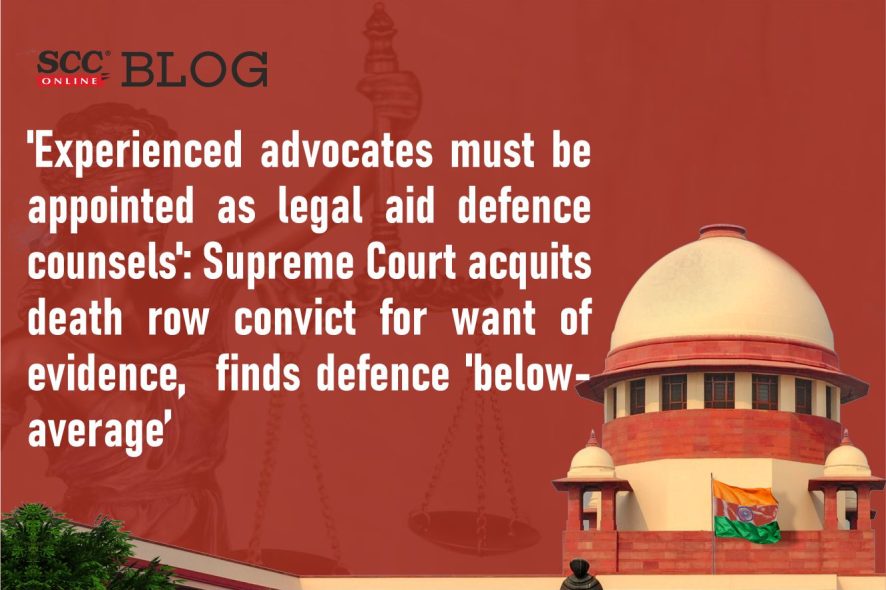Supreme Court: Disappointed with the standard of investigation and the defence put up in a gruesome case relating to murder of wife and 4 children by the accused, the 3-judge bench of UU Lalit, CJ and S. Ravindra Bhat and JB Pardiwala*, JJ has acquitted the death row convict of all charges for want of incriminating evidence against him and has observed that the District and Sessions Judges across the country conducting sessions trials, more particularly relating to serious offences involving severe sentences, should appoint experienced lawyers who had conducted such cases in the past.
Facts and Supreme Court’s Ruling
On the intervening night between 21st & 22nd of January, 2010, the accused had allegedly clobbered his wife of 12 years and 4 daughters to death with a sharp cutting weapon called Banka. The son, who was not residing with the family at the time, was saved from the wrath. As per prosecution, the motive behind the crime was the extra marital affair of the accused with one married lady whom he wanted to marry. It was alleged that the accused’s wife highly opposed to this relationship and therefore, he decided to terminate not only his wife but also his four minor daughters. He then cut their bodies into pieces.
While the Trial Court as well as the Allahabad High Court had held the accused guilty and had sentenced him to death, the Supreme Court, however, has reversed the concurrent findings of guilt recorded by the trial court and High Court after finding that none of the pieces of evidence relied on as incriminating by both the courts could be treated as incriminating pieces of circumstantial evidence against the accused.
“Realities or truth apart, the fundamental and basic presumption in the administration of criminal law and justice delivery system is the innocence of the alleged accused and till the charges are proved beyond reasonable doubt on the basis of clear, cogent, credible or unimpeachable evidence, the question of indicting or punishing an accused does not arise, merely carried away by heinous nature of the crime or the gruesome manner in which it was found to have been committed.”
The Court held that though the offence is gruesome and revolts the human conscience but an accused can be convicted only on legal evidence and if only a chain of circumstantial evidence has been so forged as to rule out the possibility of any other reasonable hypothesis excepting the guilt of the accused. Consequently, the death row convict has been set free of all the charges.
Observations on the state of Legal Aid and below-average defence
Finding that the case on hand was one of most perfunctory investigation, the Court observed that while the accused was provided with a legal aid, the cross-examination of each and every witness is below average.
“Questions, which the defence counsel was not supposed to put to the prosecution witnesses were put without realising or understanding the legal implications of the answers to such questions, more particularly, when they were not necessary. The defence counsel remained oblivious of the position of law that suggestions made to the witnesses by the defence the answers to those are binding to the accused.”
The Court observed that any defence counsel with a reasonable standing at the Bar is expected to know that cross-examination is not the only method of discrediting a witness. If the oral testimony of certain witnesses is contrary to the proved facts and if their testimony is on the face of it unacceptable, their evidence might well be discarded on that ground alone.
Hence, it was observed that while it is the duty of the State to ensure a fair defence to an accused, it is should not be done for namesake. It has to be the provision of a counsel who defends the accused diligently to the best of his abilities.
“While the quality of the defence or the caliber of the counsel would not militate against the guarantee to a fair trial sanctioned by Articles 21 and 22 resply of the Constitution, a threshold level of competence and due diligence in the discharge of his duties as a defence counsel would certainly be the constitutional guaranteed expectation. The presence of counsel on record means effective, genuine and faithful presence and not a mere farcical, sham or a virtual presence that is illusory, if not fraudulent.”
Therefore, particular attention should be paid to appoint competent advocates, equal to handling the complex cases, not patronising gestures to raw entrants to the Bar. Sufficient time and complete papers should also be made available to the advocate chosen so that he may serve the cause of justice with all the ability at his command, and the accused also may feel confident that his counsel chosen by the court has had adequate time and material to defend him properly.
Hence, urging the District and Sessions Judges across the country conducting sessions trials, to appoint experienced lawyers in serious cases, the Court suggested that the senior advocate practising in the trial court shall be requested to conduct the case himself or herself on behalf of the undefended accused or at least provide good guidance to the advocate who is appointed as amicus curiae or an advocate from the legal aid panel to defend the case of the accused persons. Then only the effective and meaningful legal aid would be said to have been provided to the accused.
[Ramanand v. State of Uttar Pradesh, 2022 SCC OnLine SC 1396, decided on 13.10.2022]
*Judgment by: Justice JB Pardiwala
For accused: Senior Advocate S. Niranjan Reddy
For State: Advocate Adarsh Upadhyay







